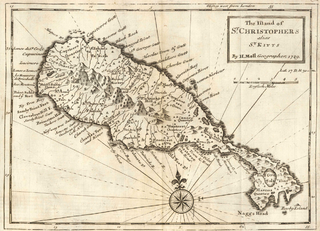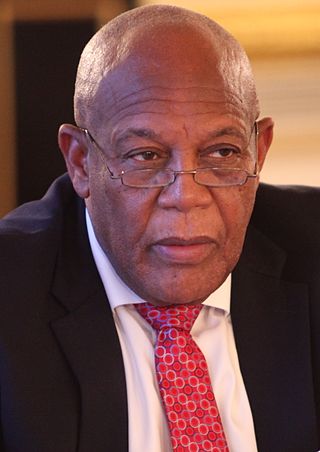
Saint Kitts and Nevis have one of the longest written histories in the Caribbean, both islands being among Spain's and England's first colonies in the archipelago. Despite being only two miles apart and quite diminutive in size, Saint Kitts and Nevis were widely recognized as being separate entities with distinct identities until they were forcibly united in the late 19th century.
The history of Anguilla runs from the beginning of human habitation, probably via settlement from South America, through its colonization by the English in the early modern period, to the present day. Following a series of rebellions and a short-lived period as an independent republic during the 1960s, Anguilla has been a separate British overseas territory since 1980.

The Anguilla Democratic Party was a political party in Anguilla. It was led by Camile Connor in 1976. At the 2005 Anguillian general election, the party first became part of the Anguilla United Front, which won 39% of the popular vote and four out of seven elected seats.

The Anguilla National Alliance was a centre-right political party in Anguilla, formed in 1980 by breaking away from the People's Progressive Party. They won one seat at the 1980 Anguillian general election, with the Anguilla United Movement winning the rest. At the 2005 Anguillian general election, the party first became part of the Anguilla United Front (AUF), that won 38.9% of popular votes and 4 out of 7 elected seats, and became a part of the AUF since then.

The Anguilla Progressive Movement is a political party in Anguilla. The party was named the Anguilla United Movement until being rebranded in 2019 alongside new leaders and colours. It was founded in early 1980 by Ronald Webster and "his former political rivals, Hubert Hughes and Colonel Claudius Roberts". Under various names, it was originally a vehicle for Ronald Webster and his supporters.

The People's Action Movement (PAM) is a political party in the island nation of Saint Kitts and Nevis. The party currently holds one of the 11 seats in the National Assembly. PAM operates only in Saint Kitts and for the 2022 general election is in a 'One Movement' alliance with the Concerned Citizens' Movement (CCM) operating in Nevis, following the breakdown of the governing Team Unity alliance. PAM is a member of the Caribbean Democrat Union, the regional affiliate of the International Democrat Union and shares close links with other centre-right party members in the Caribbean such as the Jamaica Labour Party.
The Saint Kitts and Nevis Labour Party (SKNLP), also known simply as Labour, is a centre-left political party in Saint Kitts and Nevis. It is currently in government in the country after winning six of the eleven contested seats in the 2022 general election. It is the oldest active political party in the English-speaking Caribbean.

The Premier of Anguilla is the head of government in the British Overseas Territory of Anguilla. The Premier is appointed by the Governor of Anguilla on behalf of the monarch of the United Kingdom, currently King Charles III.

Hubert Benjamin Hughes was an Anguillan politician. He was the island territory's Chief Minister from 16 March 1994 to 6 March 2000, and again between February 2010 and April 2015.
James Ronald Webster (2 March 1926 – 9 December 2016) was a politician from Anguilla. After ending the Saint Christopher-Nevis-Anguilla federation in 1967, he served as the island territory's first Chief Minister from 10 February 1976 to 1 February 1977 and again from May 1980 to 12 March 1984.

General elections were held in Anguilla on 21 February 2005 to elect the seven elected seats in the House of Assembly. The Anguilla United Front, an alliance of the Anguilla National Alliance and the Anguilla Democratic Party, won the elections retaining four of the elected seats.

The People's Progressive Party (PPP) was a political party in Anguilla.

Victor Franklin Banks is an Anguillan politician. A member of the Anguilla United Front (AUF), he served as Premier from 14 May 2019 until his defeat in the 2020 general election.
Barbara Webster-Bourne is the current Speaker of the Anguilla House of Assembly since 17 July 2020. She also held the post between 27 February 2010 and 11 May 2015

General elections were held in Anguilla on 29 June 2020. Due to the COVID-19 pandemic, an Order in Council was made to allow the elections to be postponed until 11 September at the latest. However it was not invoked.
Palmavon Webster is an Anguillian lawyer and politician. She is a former member of the House of Assembly of Anguilla and leader of the opposition.

General elections were held in Anguilla on 24 July 1972. The People's Progressive Party won six of the seven seats and its leader Ronald Webster became chair of the council. Webster was later appointed as the first Chief Minister shortly before the 1976 elections.

General elections were planned to be held in Anguilla on 25 October 1967 following the Anguillian Revolution in May. However, only five candidates stood for the five seats, with all elected unopposed.
Operation Sheepskin was a British military operation in the Caribbean, aimed at restoring British rule to the island of Anguilla, after the island had declared itself as an independent Republic. The British government dispatched two Royal Navy ships and 300 soldiers of the 2nd Battalion, Parachute Regiment and 9 Independent Parachute Squadron RE alongside 22 officers of the London Metropolitan Police to restore order to the island. The operation was a success and British troops were met with no resistance by the islanders, as they had wanted the island to remain a British territory but with direct association with Great Britain, separate from Saint Kitts and Nevis, of which they were then a part.








